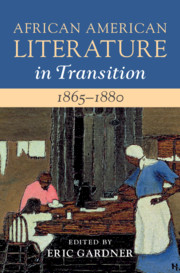Book contents
- African American Literature in Transition, 1865–1880
- African American Literature in Transition
- African American Literature in Transition, 1865–1880
- Copyright page
- Contents
- Figures
- Contributors
- Preface
- Chronology
- Black Reconstructions: Introduction
- Part I Citizenships, Textualities, and Domesticities
- Part II Persons and Bodies
- Part III Memories, Materialities, and Locations
- Chapter 9 The Civil War in African American Memory
- Chapter 10 African American Literature of the West and the Landscape of Opportunity
- Chapter 11 Reconstructions of the South in African American Literature
- Chapter 12 “This Is Especially Our Crop”: Blackness, Value, and the Reconstruction of Cotton
- Index
Chapter 10 - African American Literature of the West and the Landscape of Opportunity
from Part III - Memories, Materialities, and Locations
Published online by Cambridge University Press: 18 March 2021
- African American Literature in Transition, 1865–1880
- African American Literature in Transition
- African American Literature in Transition, 1865–1880
- Copyright page
- Contents
- Figures
- Contributors
- Preface
- Chronology
- Black Reconstructions: Introduction
- Part I Citizenships, Textualities, and Domesticities
- Part II Persons and Bodies
- Part III Memories, Materialities, and Locations
- Chapter 9 The Civil War in African American Memory
- Chapter 10 African American Literature of the West and the Landscape of Opportunity
- Chapter 11 Reconstructions of the South in African American Literature
- Chapter 12 “This Is Especially Our Crop”: Blackness, Value, and the Reconstruction of Cotton
- Index
Summary
In “African American Literature of the West and the Landscape of Opportunity,” Janet Neary considers the ways in which Black writers of the American West presented California as a brief loophole of economic opportunity for Black citizens in the expanding and consolidating nation – a way of defining place with fascinating parallels to Marrs’s work on memory. Although early Black newspapers in California linked economic mobility with legal enfranchisement, Neary suggests that California’s idiosyncratic response to Reconstruction paradoxically shut down certain avenues of opportunity for Black citizens, centering wealth production with white property owners. Focusing on James Williams’s 1873 Life and Adventures of James Williams and Thomas Detter’s 1871 Nellie Brown, or the Jealous Wife, Neary argues that African American Western writers articulated economic possibility and upward mobility with social justice and racial equality, while simultaneously highlighting the mercenary and racially biased nature of the law both before and after Reconstruction.
Keywords
- Type
- Chapter
- Information
- African American Literature in Transition, 1865–1880Black Reconstructions, pp. 233 - 258Publisher: Cambridge University PressPrint publication year: 2021

